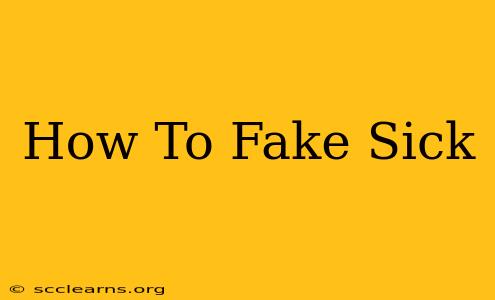How To Fake Sick (And Why You Shouldn't)
Let's be honest, we've all been there. That overwhelming feeling of dread washes over you as you contemplate another day at work or school. The temptation to call in sick, even if you're not actually ill, can be incredibly strong. This guide explores the common methods people use to fake sickness, but more importantly, it emphasizes why faking illness is generally a bad idea and what healthier alternatives you should consider.
Common (But Ineffective) Tactics for Faking Sickness
Many attempt to fake illness using a variety of methods, ranging from the somewhat believable to the downright ridiculous. Some popular (but ultimately unreliable) tactics include:
-
The Classic "Stomach Ache": This is a go-to for many, but it's easily debunked if you're seen acting normally later. Remember, consistent symptoms are key for believable faking, and this is very hard to maintain throughout the day.
-
The "Mysterious Fever": Claiming a high fever is risky. Unless you're visibly flushed and sweating profusely (and even then!), your claim might be doubted. Employers or teachers may request verification.
-
The "Allergies": While allergies are genuine and can be debilitating, faking them is difficult. Consistent sneezing or coughing without other accompanying symptoms (like a runny nose or watery eyes) can raise suspicion.
-
The "Headache/Migraine": Again, a very common excuse. But without visible symptoms or a documented history of these conditions, it's not very convincing.
-
The "Sore Throat/Voice Loss": While a convincingly raspy voice can be convincing for a short time, maintaining it throughout a phone call or interaction is challenging.
The Risk Factor: While these tactics might work once, consistently faking illness will severely damage your credibility. This can lead to:
- Loss of Trust: Your boss or teacher will lose faith in your reliability.
- Disciplinary Action: Depending on your situation, faking illness could lead to warnings or even termination.
- Damaged Reputation: Your reputation within your workplace or school could be tarnished.
- Missed Opportunities: While you’re home faking illness, others are seizing opportunities and advancing their career.
Better Alternatives to Faking Illness
Instead of resorting to deceitful tactics, consider these healthier options:
-
Honest Communication: Talk to your boss or teacher. Explain that you need a day off for personal reasons. Be upfront, and most understanding employers will respect your request.
-
Mental Health Days: Recognize the importance of mental well-being. A day of rest and relaxation can significantly improve your productivity in the long run. Many companies are now embracing mental health days as a legitimate reason for absence.
-
Doctor's Note: If you're genuinely unwell but not severely ill, a doctor's note can provide a legitimate reason for your absence.
-
Prioritize Self-Care: Addressing the underlying reasons for your burnout is crucial. This could involve better time management, seeking support from friends or family, or even professional help.
In Conclusion: Faking illness might seem like an easy way to get a day off, but the long-term consequences far outweigh any short-term benefits. Choose honesty and prioritize your well-being. Open communication and self-care are always better strategies than deception.

